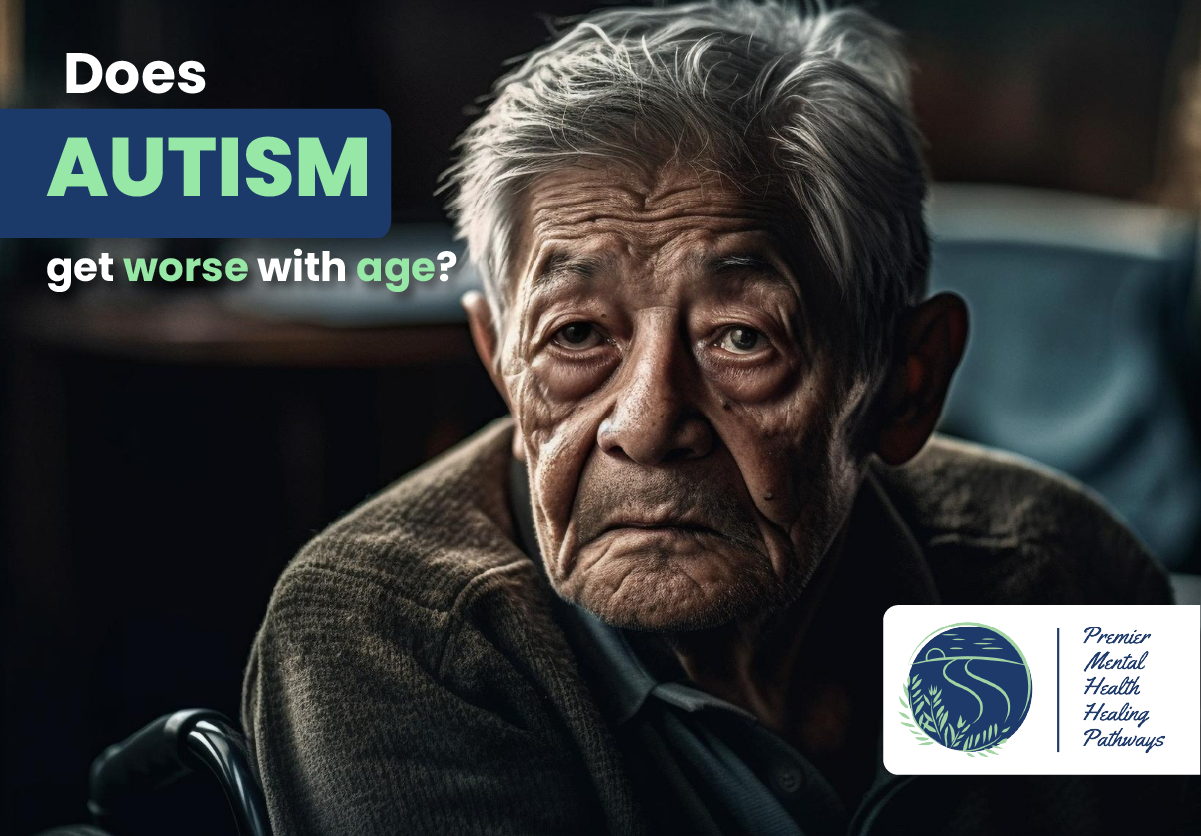Do you know Does Autism Get Worse with Age?
As a parent of a child with autism, you know how hard it can be to raise them. You have seen your child have trouble talking to others, making friends, and behaving in certain situations. You might also worry about how they will change as they get older and what you can do to help them grow and learn.
Premier Mental Health Healing Pathways can provide valuable support for your mental health, especially if you have autism. They are experts in helping people like you take care of your mental well-being.
Let’s explore, Does autism get worse with age?
Understanding How Autism Changes
Researches are still studying how autism changes over time, but what they know so far is that it does not always get worse as a person gets older.
One study found that while some kids with autism might have more severe symptoms as they grow up, others might have fewer symptoms or no change at all.
The study also found that having a learning disability or certain medical problems might mean a person’s autism symptoms could get worse over time.
Another study found that autism can be different for each person. Some kids might get much better with time, while others might stay the same or get worse. The study also showed that getting help early, like therapy, can make a big difference in how well a child with autism does.
What Can Make Autism Symptoms Worse?
Although autism itself does not usually get worse as you grow up, there are things that can make the symptoms more severe or make it harder to cope.
Some things that can make autism symptoms worse include:
- Having Other Health Problems: Kids with autism might also have other health issues like epilepsy, anxiety, ADHD, or trouble sleeping. These problems can make autism symptoms more severe and make it harder to do everyday things.
- Growing Up and Changing: Going through puberty and becoming a teenager can be tough for anyone. But for kids with autism, these changes can be even harder. Hormone changes and feeling pressure to fit in can make autism symptoms worse and make it harder to do things.
- Changes in Routine: Kids with autism often like things to be the same and predictable. If things change, like moving to a new home or school, it can be really stressful and make autism symptoms worse.
Why Do Autistic People Look Young?
Why do some autistic people seem younger than their age?
It could be because they move, talk, or act in ways that are like younger kids.
They might also like things or act in ways that are more common in younger people.
However, it is important to know that everyone is different, and looking young does not change who they are.
Autism Is Ruining My Life
Feeling like autism is making life hard is normal for many people dealing with autism. It is good to know that while autism brings its own challenges, it does not have to control your whole life.
Getting help from doctors, therapists, and groups that support people with autism can make a big difference.
You are not alone, and there are people who can help you get through these tough times.
Does High-Functioning Autism Get Worse with Age?
High-Functioning Autism (HFA) is a type of autism where people are smart and can speak well, but they find it hard to communicate and behave in social situations. HFA can change as a person grows up, but it does not always get worse.
HFA is often found out later in childhood or when a person is a teenager. This means that people with HFA might have had more time to learn how to deal with their symptoms before they knew they had it.
As they become adults, some people with HFA might find new challenges with work, relationships, and being independent. They might need help to understand how to act in social settings at work or how to handle stress and worry.
It is important to know that many adults with HFA do well in their jobs and personal lives. With the right help and changes, they can do well and have happy lives.
Getting help early and having support along the way is important for people with HFA to do their best.
Managing Autism in Adulthood
Even though autism does not always get worse as people get older, it is still important for adults with autism to get the right help. This can include things like therapy, medicine, or other ways to manage symptoms and have a better life.
Some people with autism might also do well with training to improve their social or job skills. This can help them be successful at work or in social settings.
Having a supportive community is also really important for adults with autism. This can be family, friends, or groups that understand and can give emotional support.
The Role of Genetics
Even though we do not know all the reasons why autism happens, we do know that genes are really important. If someone in your family has autism, you might be more likely to have it too.
Some studies have shown that certain changes in genes can make autism more likely and might affect how serious the symptoms are.
For example, changes in the SHANK3 gene can increase the chances of autism and make the symptoms worse.
Understanding how genes are involved in autism can help doctors find the best treatments and support.
They can look at a person’s genes to see if there is a higher risk and offer the right help. But it is also important to know that genes are just one part of why autism happens. Things in the environment and a person’s life also play a role.
Importance of Early Intervention
Getting help early is really important for kids with autism. The sooner they get therapy and support, the better they can do. Studies show that kids who get help early often get better at talking, being with others, and controlling their behavior compared to those who do not.
Early help can also make a big difference in how autism affects a child as they grow up. By giving specific therapies and help when they are young, kids with autism can learn new things that can help them handle their symptoms better as they get older.
Parents and caregivers should know the signs of autism so they can get help quickly. Some signs include not talking as much as other kids, having trouble with friends, doing the same things over and over, or being sensitive to things like noise or touch.
If you think your child might have autism or need help, talk to doctors or groups in your community. With early help and support, kids with autism can have happy lives.
Does Autism Get Worse As You Get Older?
Autism itself does not get worse with age, but the problems it causes can change. Things like having other health issues, changes in your daily routine, and how you interact with others can make autism harder to deal with as you grow up. Everyone’s experience with autism is different, so it is important to talk to doctors and people who can help you figure out what you need as you get older.
What Can Cause Autism to Worsen As People Get Older?
Even though autism does not always get worse as people get older, there are things that can make it harder to deal with. For example, feeling stressed or anxious can make autism symptoms worse.
As people grow up, they might have new things to worry about, like work, relationships, or health problems. These things can make their autism symptoms worse.
Also, some medical conditions or medicines for other problems can make autism symptoms more severe.
Not having enough support can also make autism symptoms worse. When kids with autism grow up, they might not have the same help and services they had when they were younger. This can make them feel alone and make it hard to manage their symptoms.
It is important for people with autism and their families to know about these challenges so they can deal with them early. This might mean getting more help or talking to doctors about other health problems that could be making the symptoms worse.
With the right help, many people with autism can do well as adults and have happy lives.
The Role of Exercise in Managing Autism Symptoms Over Time
Doing regular exercise can help people with autism in many ways. It is not just good for your body, but it can also help with autism symptoms.
Studies have shown that exercise can make you feel happier and less anxious if you have autism. This is because when you exercise, your body makes chemicals that make you feel good.
Exercise can also be a good way to deal with stress and anxiety. It can also help you get better at being around other people. For example, playing sports or joining fitness classes can help you make friends and learn social skills.
When you exercise regularly, you might feel more confident and better about yourself. It can also help you get used to different things you might feel or hear, which can make you less sensitive to them over time.
It is important to find the right kind of exercise that you enjoy. Some people with autism like gentle activities like yoga or swimming, while others prefer more energetic activities like running or martial arts. The key is to find something you like so you keep doing it.
Adding regular exercise to your routine can help you manage autism symptoms better. It is always a good idea to talk to a doctor before starting any new exercise plan.
Medicine for Autism Symptoms
While there is no cure for autism, medicine can help manage its symptoms. But it is important to know that medicine does not work the same for everyone with autism.
One good thing about medicine is that it can also help with other problems like anxiety or ADHD that some people with autism might have. For example, someone with autism and ADHD might take medicine to help them focus better.
But there can also be bad things about taking medicine. Some medicines might have side effects that make life harder or make autism symptoms worse. And some people with autism might find it hard to talk about how the medicine makes them feel.
Doctors and families need to think carefully about whether medicine is right for each person with autism. They need to talk and decide together what is best for that person.
Conclusion
Does autism get worse with age? Autism does not necessarily worsen with age. While some may have more severe symptoms over time, others see no change or even improvement. Early intervention, like therapy, can make a big difference. Factors like health issues, puberty, and routine changes can affect how well someone copes. Support and care are crucial for helping individuals with autism lead fulfilling lives.
FAQs
How does nonverbal autism affect speech therapy?
Nonverbal autism refers to individuals who have difficulty or are unable to speak. Nonverbal autism Speech therapy can help improve communication skills through alternative methods like sign language, picture communication, or augmentative and alternative communication devices.
What happens if autism is not treated?
Untreated autism can create difficulties in socializing, communicating, and behaving, impacting daily life and relationships.
Does autism get worse with age?
Autism itself does not worsen with age, but the challenges it poses can change. Factors like health issues, routine changes, and social interactions can impact how someone copes with autism as they grow older.






No comment